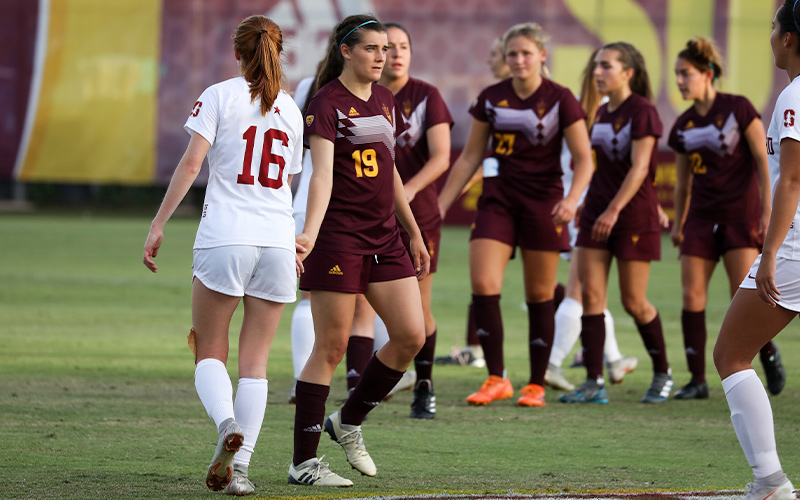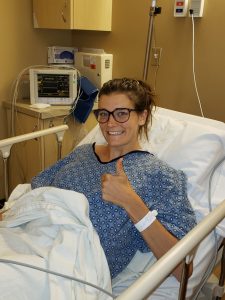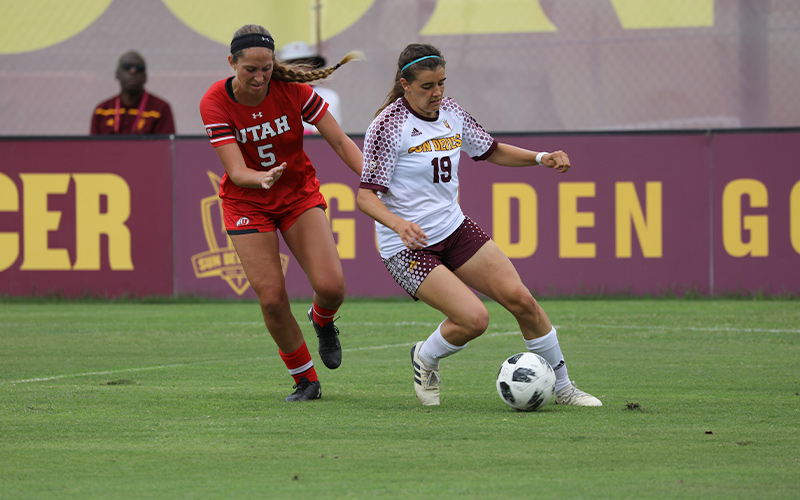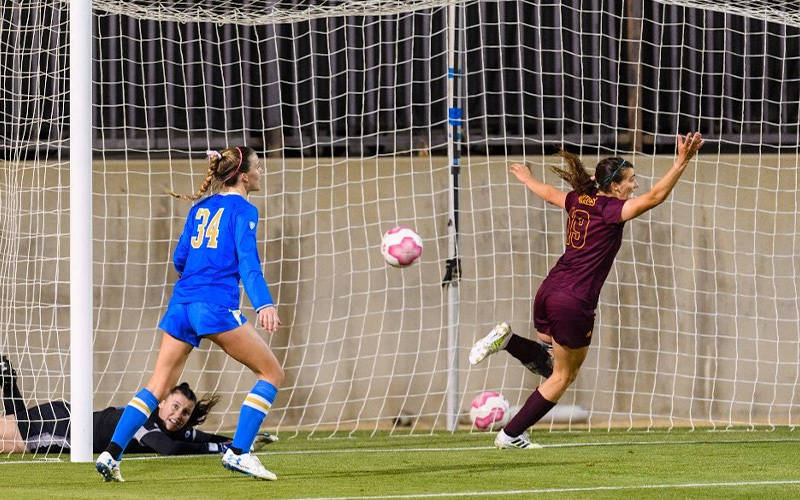PHOENIX – Two years off the pitch nearly was enough time to snatch away Cori Sullivan’s dreams of playing college and professional soccer.
The Arizona State junior faced two devastating blows that left her feeling hopeless – but just for a moment – and the experience continues to be a daily reminder that helps her embrace each day.
It all started before Sullivan’s freshman year of college in 2018, when she was diagnosed with celiac disease. Although she played in 18 games her freshman season, she battled through many illnesses.
“I just overcame so much adversity, in the first place with the celiac and the Hashimoto, and then the ACL,” Sullivan said. “I was just like, you got to be kidding me, like, you’ve got to be kidding me. I thought I already hit rock bottom, but this (ACL injury) is like a new rock bottom.”
Celiac disease, an autoimmune condition, causes an inflammation in the small intestine when gluten is ingested. This inflammatory response can affect one’s ability to obtain the necessary nutrients, leading to a wide array of symptoms, such as weight loss, joint pain and even cognitive impairments.
Given that Sullivan understood the foods to avoid to limit her flareups, she began encountering new symptoms: double vision during some matches, drastic weight changes and stiff joints that made it hard to move.
“I remember a couple of games like the last time we played UCLA having double vision,” she said. “It’s hard to play soccer anyway, but when you’re seeing two balls, and you don’t know which one is which, it’s incredibly hard.”
Instead of relaxing on the weekends when the team had home matches, Sullivan was at Mayo Clinic getting test after test in a search for answers.
At one point, Sullivan could only consume carbohydrates by eating sweet potatoes because her immune system didn’t react well to anything else. The lack of nutrients affected her performance and her ability to do simple things.

Although Cori Sullivan played 18 games as a freshman, she battled illness and experienced double vision during some matches. (Photo by Alina Nelson/Cronkite News)
“It was hard to attend classes and just hard to even get out of bed,” she recalled.
The new symptoms were enough to make the tough decision to sit out her sophomore season.
After traveling around the country to different doctors, she eventually received confirmation in the middle of 2019 that she has Hashimoto’s disease – another autoimmune disorder in which the immune system attacks the thyroid gland. It’s typically seen in those with an underactive thyroid gland, causing symptoms such as fatigue, sluggishness, unexplained weight gain and muscle aches.
Before her diagnosis, Sullivan had many breakdowns because no one had answers for quite some time. In those dark moments, she was supported by her family, friends and teammates.
She reflected how teammate Eva Van Deursen spent nights just crying and doing research with her to try and figure out what was going on.
“It was very hard to see, especially because we’re here with one goal, to have fun together and she could barely be part of it,” Van Deursen said.
Sullivan eventually found ways to calm her immune system by the end of 2019, adjusting her sleep habits, stress level and diet. Those changes helped her get in the best shape of her life to play soccer again.
At the beginning of 2020, she hoped to begin spring practice with the team but that didn’t happen because of the COVID-19 pandemic. With the cancellation of collegiate sports, she sought other ways to stay fit for fall season.
Instead of summer team practices, Sullivan played street-style soccer with guys she grew up with in Prescott. She described those training sessions as fun and laid back, but one play ended that session.
Sullivan recalled how she was running for a bouncing ball, and as she stuck her leg out, she was kicked from the side. Her recollection of that day was a blur, but she immediately knew her injury was serious.
“All I know, I was running one way, and then I heard my knee crack, like five different pops,” she said. “And I fell and landed the other way, and I looked down at my knee, and I’m pretty sure the kneecap was dislocated.”
“They had to call 911 and give me fentanyl before they could relocate it and put my leg in a splint and take me to the hospital,” she said.
Within a matter of days, the extensive knee damage was confirmed with MRI results – a torn ACL, torn meniscus and an extensive bone bruise.
After receiving that news, Sullivan had doubts whether she would ever play again.
However, that uncertainty quickly shifted with the help of her support system and the reminder of why she fell in love with soccer at age 5.
“Remembering how much I love soccer, kind of getting back to that little kid mentality, like the reason that you play,” she said. “Sometimes I feel like that can be lost just with all the pressure that we put on ourselves, especially as college athletes.”
That joy she gets from soccer was the boost that helped her get back up – once again.

Doctors repaired ligaments in Cori Sullivan’s knee to address the instability. Recovery was a challenge, but she found her way back on the pitch. (Photo courtesy Sullivan family)
After doctors repaired ligaments in her knee to address the instability, the recovery was another challenge from the intense pain, fear of reinjury and the struggles of doing simple things, such as walking.
“The fear of pain, I think is one of the most dangerous forms of fear, because it inhibits you to do anything,” she said.
Throughout the rehab process, Sullivan received encouragement from her physical therapist to trust the knee and focus on the small steps. The constant encouragement built her confidence to return to the pitch.
Mark Kyger, Arizona State medical coordinator, said it’s not uncommon for athletes to have some fears returning or integrating with the team. And in many cases, athletes have the avenue to work with a sports psychologist.
In addition, his medical team completes a rigorous amount of testing so athletes are aware each step of the way to ensure they return safely.
“We go through certain outcome measures so athletes can have a goal of what we need to get to, whether it’s strength profile, jump or power force plate profile,” Kyger said.
He said Sullivan was able to meet every clinical milestone, despite some setbacks, due to her work ethic, dedication and willingness to improve each day.
“She just kind of progressed, day after day, and she always brought a real positive attitude every day and that allowed things to go a lot quicker on my end,” Kyger added.
Although the doctor’s initial time frame was at least 10 months before she would play without restrictions, she returned in early March – in nine months.
After clearance by two surgeons, Sullivan couldn’t help but reflect on the strength and the support she received, especially her family, to have another chance to play another college match.

Sullivan said, “Remembering to be grateful and to be joyful helps put less pressure on myself and allows me to play more freely.” (Photo by Alina Nelson/Cronkite News)
That mental toughness has helped her shine in the four matches she’s played. In the first match she started against No. 3 UCLA, she scored the golden goal in overtime.
That win was historic for ASU, as they hadn’t beaten UCLA since 2000, marking its second in program history.
Although Sullivan has returned, Kyger said her rehabilitation continues in some regard until at least the one year to one and half year mark to fine tune some areas.
So far, Sullivan continues to take the necessary measures such as icing, wearing her compression, and continuing to attend treatments to reach the top of her game.
Despite the additional measures to manage her health, she’s just grateful to be playing the game she loves.
“ I really like her motto, ‘even then.’” Deursen said. “It says even when the lowest things happen, even then she finds the courage to keep going to not give up on the dream that she has. It took so long for her to return, but even then, she’s back.”
Sullivan is now more aware of how to navigate life being a student-athlete with two autoimmune diseases, but she’s realistic and doesn’t let that be a reason to stop playing.
Although she can’t control everything, she’s focused on having a neutral mindset, taking it one day at a time, and learning from her failures, without being so tough on herself.
Before Sullivan steps on the field, she tells herself a few words: “You’re going to be a hard-working player, you will be confident in yourself, and you will be joy.’”
So far, her motto has helped her contribute to an Arizona State women’s soccer team (8-2-2) that sits in second place in conference play (4-1-2).
“Remembering to be grateful and to be joyful helps put less pressure on myself and allows me to play more freely,” Sullivan said.
The strength to get through those rock bottom moments are enough of a reminder to embrace each day and to never stop chasing her soccer dreams.
